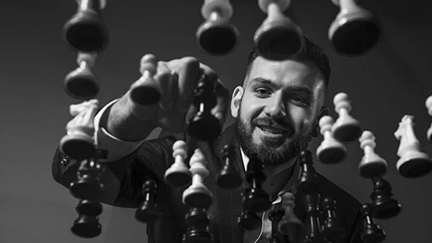COLUMBIA, Mo. — In just five short years, the Mizzou Chess Team has electrified the college chess scene with dominant performances on the biggest stages in the game. Under the guidance of head coach Cristian Chirila — a chess grandmaster from Romania who’s played the game since the age of 5 — Mizzou’s meteoric rise has cemented its place among the nation’s top college chess programs.

Fresh off the team’s most recent win at the 2024 Pan-American Intercollegiate Team Chess Championship — the most prestigious event in the Americas — MU’s chess stars have qualified for the 2024 President’s Cup, informally known as the Final Four of college chess, taking place this weekend in Dallas. It’s their second consecutive trip.
A partnership between MU and the St. Louis Chess Club helped form the team in 2019.
“The support of the St. Louis Chess Club and their co-founders, Jeanne and Rex Sinquefield, have been integral to our success,” Chirila said. “They do a fantastic job of promoting chess, including drawing in global professional chess players for competitions. They’ve supported our players through numerous opportunities for both competition and training. We look forward to continuing our fruitful partnership.”
Below, as Mizzou prepares to face off against the University of Texas at Dallas, University of Texas Rio Grande and Webster University at the 2024 President’s Cup, Chirila shares some of the basics of how the game of chess is played and how Mizzou is preparing for the President’s Cup.
What’s the point of chess?
Checkmate! Chess is a game of strategy. You’re trying to put your opponent’s king in check while protecting your own king.
How does the point system work?
- Individual: The winner of an individual game gets one point. In a tie, each person gets half a point.
- Team: The winning team must score 2.5 points based on the individual scoring system. For example, in the Final Four, the team that scores 2.5 points wins the match.
What are the different stages of a chess game?
- Opening: The opening phase dictates the game. Most focus, about 80%, goes into preparing for this stage, which demands memorization and attention to detail.
- Middlegame: Here’s where players need to be creative. It’s about blending tactical skills and strategic abilities to maneuver pieces swiftly or slowly, depending on time limits.
- Endgame: Not all games reach this stage. If you do, it’s likely you and your opponent have been evenly matched. With fewer pieces on the board, the game becomes more technical.
How important is time management in the game of chess?
Time management is crucial. During the game, you must learn how to spot the critical moment, either by making decisions quickly or taking more time for more important decisions. Also, even if you’re winning, you can lose the game by running out of time.
How is Mizzou preparing for the President’s Cup?
Typically, we hold group training twice a week to help sharpen our skills, while individual training sessions are conducted on a flexible schedule based on a players’ individual academic schedules and tournament play. Conveniently, our training facility is in the same dorm where players reside, making it easy for them to come and go as needed.
In both mind and body, our players vary in their approaches to prepare for a game. As the coach, I use motivational tactics to develop their inner competitive drive with the goal of boosting their mental prowess. Everyone builds their mental capacity in different ways.
In preparation for the President’s Cup, our players have competed in multiple events during the month of February to maintain their skills. We are also developing personalized training plans with each player based on our opponents that we will be facing in Dallas.
